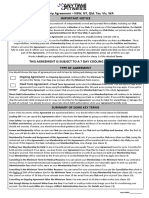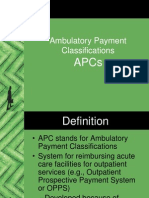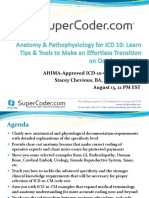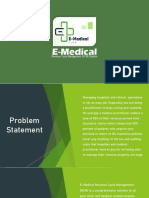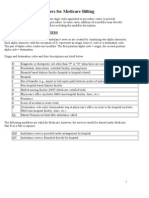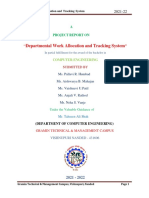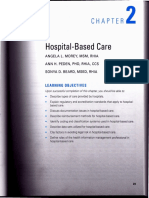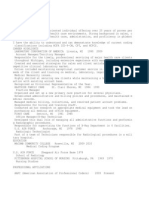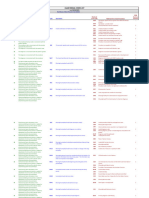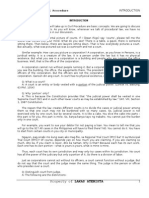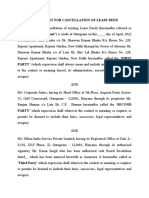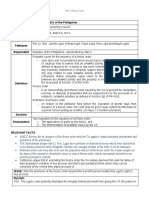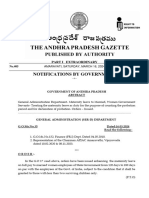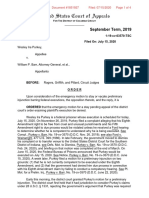837P CMS 1500
837P CMS 1500
Uploaded by
Gajapathi KCopyright:
Available Formats
837P CMS 1500
837P CMS 1500
Uploaded by
Gajapathi KOriginal Title
Copyright
Available Formats
Share this document
Did you find this document useful?
Is this content inappropriate?
Copyright:
Available Formats
837P CMS 1500
837P CMS 1500
Uploaded by
Gajapathi KCopyright:
Available Formats
Medicare Billing: 837P & Form CMS-1500
CPT codes, descriptions and other data only are copyright 2020 American Medical Association. All rights reserved.
Applicable FARS/HHSAR apply. CPT is a registered trademark of the American Medical Association. Fee schedules,
relative value units, conversion factors and/or related components are not assigned by the AMA, are not part of CPT, and
the AMA is not recommending their use. The AMA does not directly or indirectly practice medicine or dispense medical
services. The AMA assumes no liability for data contained or not contained herein.
Page 1 of 8 MLN006976 September 2021
Medicare Billing: 837P & Form CMS-1500 MLN Fact Sheet
What’s Changed?
● Added new tool (page 3)
● Added late claims exceptions (page 6)
● Added electronic filing exceptions & waiver requests information
● ASCA exceptions (page 7)
● Waiver requests (page 8)
● Booklet reordered (throughout)
You’ll find substantive content updates in dark red font.
Page 2 of 8 MLN006976 September 2021
Medicare Billing: 837P & Form CMS-1500 MLN Fact Sheet
This booklet offers education for health
care administrators, medical coders, Together we can advance health equity and help
billing and claims processing personnel, eliminate health disparities for all minority and
and other medical administrative staff underserved groups. Find resources and more from
responsible for submitting Medicare the CMS Office of Minority Health:
professional and supplier claims using
the 837P or Health Insurance Claim ● Health Equity Technical Assistance Program
Form (CMS-1500) (referred to as
● Disparities Impact Statement
CMS-1500 throughout).
Note: The term patient refers to a Medicare beneficiary.
New Tool
An Administrative Simplification Enforcement and Testing Tool (ASETT) is available through
CMS’s Identity Management (IDM) System. The Test Transaction Tool checks all transactions
for compliance, syntax, and business rules. Validate transactions across various formats:
● ASC X12 5010
● NCPDP D.0
● ICD-10 diagnostic and procedure codes
● Unique Identifiers
Submitting Accurate Claims
Health care professionals and suppliers must submit accurate claims (get information in the
Medicare Program Integrity Manual, Chapter 4) and maintain current Medicare billing knowledge (get
information in the Medicare Claims Processing Manual).
Medicare coverage and payments require an item or service:
● Meet a benefit category
● Isn’t specifically excluded from coverage
● Is reasonable and necessary
Submit all documentation your Medicare Administrative Contractor (MAC) needs to support the
patient’s medical need when requested.
Page 3 of 8 MLN006976 September 2021
Medicare Billing: 837P & Form CMS-1500 MLN Fact Sheet
837P
The 837P (Professional) is the standard format health care professionals and suppliers use to send
health care claims electronically.
ANSI ASC X12N 837P
The ANSI ASC X12N 837P (Professional) Version 5010A1 is the current electronic claim version. Find
more information on the ASC X12 website.
The National Uniform Claim Committee (NUCC) developed a crosswalk between the ASC X12N 837P
and hard copy claim form (MACs may include a crosswalk on their websites).
ANSI: American National Standards Institute
ASC: Accredited Standards Committee
X12N: Insurance section of ASC X12 for the health insurance industry’s administrative transactions
837: Standard format for sending health care claims electronically
P: Professional version of 837 electronic format
Form CMS-1500
We allow physicians, practitioners, and suppliers to submit a 1500 Health Insurance Claim Form
under certain situations.
Sometimes providers use the 837P and CMS-1500 to bill certain government and private insurers.
We make data elements in the uniform electronic billing specifications consistent with the hard copy
data set to the extent that 1 processing system can handle those claims.
Coding
Correct coding’s important when submitting valid claims. Use current diagnosis and procedure codes
and complete claims to the highest specificity level available (maximum digit number) to ensure the
most accurate claims. Medicare Claims Processing Manual, Chapter 23 has information on diagnosis
coding, procedure coding, and codes with modifier instructions.
Page 4 of 8 MLN006976 September 2021
Medicare Billing: 837P & Form CMS-1500 MLN Fact Sheet
Diagnosis Coding
Use ICD-10-CM to code claims’ diagnostic information. The CDC website has access to ICD-10-CM
codes electronically, or you can buy hard copy code books from code book publishers.
Procedure Coding
Use HCPCS Level I and II codes to code all claim procedures. Level I CPT-4 codes describe medical
procedures and professional services. CPT’s a numeric coding system the American Medical
Association (AMA) maintains. Get the CPT code book at the AMA Bookstore.
The Medicare Learning Network® (MLN) has an Evaluation and Management Services Guide
(HCPCS Level I codes subset).
HCPCS Level II, a standardized coding system used primarily to identify products, supplies, and
services not included in CPT codes when used outside a physician’s office or injections administered
within a physician’s office or clinic. To view these codes, review the HCPCS code book or visit the
Alpha-Numeric HCPCS webpage.
Submitting Medicare Claims
The Medicare Claims Processing Manual has submitting claims instructions:
● Chapter 1 has health care professionals and suppliers general billing requirements
● Chapter 24 explains electronic filing requirements and the Electronic Data Interchange (EDI) form
required before submitting electronic claims
● Chapter 26 explains what each 837P or CMS-1500 claim must include
The Medicare Benefit Policy Manual and Medicare National Coverage Determinations Manual include
helpful, submitting claims coverage information.
Modifiers
Use proper modifiers with procedure codes to submit correct claims. The AMA’s CPT code
book includes HCPCS Level I codes and modifiers. The HCPCS code book includes HCPCS
Level II codes and related modifiers. Resources about modifiers:
● Proper Use of Modifiers 59 & –X{EPSU} fact sheet explains correct use of modifiers 59 and
–X{EPSU}
● Physician Bonuses webpage explains whether you must use a modifier to get a Health
Professional Shortage Area (HPSA) bonus payment
● Medicare Claims Processing Manual offers modifier information
Page 5 of 8 MLN006976 September 2021
Medicare Billing: 837P & Form CMS-1500 MLN Fact Sheet
Where to Submit Claims
For patients enrolled in Medicare Fee-for-Service (FFS), submit service claims to your MAC. You
can’t charge patients for completing or filing a claim. We subject providers to penalties for violations.
For patients enrolled in a Medicare Advantage (MA) Plan, submit claims to the patient’s MA Plan.
For patients with primary coverage other than Medicare, also known as Medicare Secondary Payer
(MSP), you must bill the correct insurer first. Find information in the Medicare Secondary Payer booklet
and the Medicare Secondary Payer Provisions Web-Based Training (WBT) course.
Timely Filing
Providers must file Medicare claims to their MAC no later than 12 months, or 1 calendar year, after
the service date.
We’ll deny claims if they arrive after the deadline. When we deny a claim for timely filing, this isn’t the
same thing as an initial determination. If you don’t file the claim timely, you can’t appeal it for payment.
For claims submitted by health care professionals and suppliers that spans service dates, we use
the line item From date to determine the claims filing timeliness service date (this includes durable
medical equipment, supplies, and rental items). If a line item From date isn’t timely but there’s a
timely To date, we split the line item and deny the untimely services.
Late Claims Exceptions
Find information on timely filing exceptions at Medicare Claims Processing Manual, Chapter 1, Section 70.5.
Electronic Transactions Implementation & Companion Guides
Health care professionals or suppliers billing electronic claims must comply with the ASC X12N
implementation guide. You can buy the 837P Health Care Claim: Professional Implementation Guide.
It has instructions on content and format requirements for each standard’s requirements. ASC X12N
implementation guides are specific technical instructions for implementing each adopted HIPAA
standard and have instructions on content and format requirements for each standard’s requirements.
ASC X12N writes these documents for all health benefit payers.
● Each MAC publishes a CMS-approved Medicare FFS HIPAA 837P Companion Guide (CG).
● CG defines specific Medicare FFS data content requirements used with, but not in place of, the
HIPAA 837P.
● Find your MAC’s website or review the Medicare Fee-for-Service Companion Guides webpage
to locate your CG.
Implementation and companion guides are technical documents and you may need help from
software vendors or clearinghouses to interpret and implement the information.
Page 6 of 8 MLN006976 September 2021
Medicare Billing: 837P & Form CMS-1500 MLN Fact Sheet
Electronic Filing Exceptions & Waivers
Providers must submit initial Medicare claims electronically unless they qualify for a waiver or
exception under the electronic claims submission Administrative Simplification Compliance Act
(ASCA) requirement.
ASCA Exceptions
Before submitting a hard copy claim on CMS-1500, determine if it meets 1 or more ASCA exceptions.
Medicare exempts health care professional and supplier billing when you:
● Have less than 10 Full-Time Equivalent (FTE) employees and bill a MAC
● Roster bill, which allows mass immunizers to complete 1 CMS-1500 with the shot type (flu or
pneumococcal) and attach a roster listing patients who got that shot, rather than submitting
separate CMS-1500 claim forms
● Submit paper claims under a Medicare demonstration project
● Submit MSP claims when there’s more than 1 primary payer and more than 1 allowed amount,
including more than 1 contractual obligation amount, as applicable
If you meet an exception, you don’t need to submit a waiver request. Health care professionals or
suppliers who submit paper claims exception justification are either:
● Notified of approval by mail
● Notified exception wasn’t approved, and all their paper claims denied, effective the 91st day after
the first letter date requesting documentation
Health care professionals or suppliers who don’t respond to a request for exception information get
denied paper claims, effective the 91st day after the first letter date requesting documentation.
Health care professionals or suppliers can’t appeal these decisions.
Page 7 of 8 MLN006976 September 2021
Medicare Billing: 837P & Form CMS-1500 MLN Fact Sheet
Waiver Requests
These Unusual Circumstance Waivers are subject to Provider Self-Assessment and always meet
waiver criteria:
● Dental claims
● Electricity or phone communication disruption
● Large group practice or supplier that submits less than 10 claims per month and not more than
120 claims per year
Unusual Circumstance Waivers require Medicare pre-approval to submit paper claims in these situations:
● Provider alleges claim transaction implementation guides adopted under HIPAA don’t support
electronic submission of all data required for claim adjudication
● Provider isn’t small, but all those employed have documented disabilities that prevent personal
computer use for electronic claim submission
● Any other unusual situation documented by a provider to establish enforcement of electronic claim
submission requirements is against equity and good conscience
Find more information about ASCA waivers and exceptions on the Electronic Billing & EDI
Transactions webpage.
Find more information on ASCA health care professionals and suppliers electronic billing requirements
and enforcement reviews in Medicare Claims Processing Manual, Chapter 24, Sections 90–90.6.
Download a sample Form CMS-1500. We don’t accept CMS-1500 copies for claim submission
because they may not accurately replicate form colors. The system requires the colors for automated
form reading. We only accept claim forms printed in Flint OCR Red, J6983, (or exact match) ink. Visit
the U.S. Government Bookstore to order the form, or contact local printing companies or office supply
stores to get them.
Resources
● EDI Helpline
● HIPAA and Administrative Simplification webpage
● Medicare Billing: Form CMS-1500 and the 837 Professional web-based training
● OIG Office of Audit Services (reports about specific coding and billing issues)
Medicare Learning Network® Content Disclaimer, Product Disclaimer, and Department of Health & Human Services Disclosure
The Medicare Learning Network®, MLN Connects®, and MLN Matters® are registered trademarks of the U.S. Department
of Health & Human Services (HHS).
Page 8 of 8 MLN006976 September 2021
You might also like
- DrChrono User GuideDocument22 pagesDrChrono User GuideDerek TerrellNo ratings yet
- Chapter 1. Role of An AR Executive in RCMDocument2 pagesChapter 1. Role of An AR Executive in RCMyagnamunishivanayakNo ratings yet
- Anytime Fitness Membership Agreement All StatesDocument13 pagesAnytime Fitness Membership Agreement All StatesNick Sche100% (1)
- Chda Exam 2 2024 With 100Document31 pagesChda Exam 2 2024 With 100Wanjeri DavidNo ratings yet
- Read Book CPT Coding GuidelinesDocument7 pagesRead Book CPT Coding GuidelinesnerdinaNo ratings yet
- Palliative Care Billing 101Document47 pagesPalliative Care Billing 101mturchiano100% (1)
- A Problem of Display Codes Case StudyDocument7 pagesA Problem of Display Codes Case StudyJam EsNo ratings yet
- 3 2 1 Code It 6th Edition Green Solutions Manual DOWNLOAD YOUR FILES DownloadDocument131 pages3 2 1 Code It 6th Edition Green Solutions Manual DOWNLOAD YOUR FILES DownloadelizabethNo ratings yet
- Emis Web User Guide PDFDocument7 pagesEmis Web User Guide PDFdsaroha1100% (1)
- Ambulatory Payment Classifications (APCs)Document44 pagesAmbulatory Payment Classifications (APCs)timvrghs123No ratings yet
- Icd CodingDocument58 pagesIcd CodingagnaveenanNo ratings yet
- HI 215 Purdue University Global Payment and Reimbursement Process Case StudyDocument2 pagesHI 215 Purdue University Global Payment and Reimbursement Process Case StudyAlejandro VeraNo ratings yet
- Fordneys Medical Insurance 15th Smith Test BankDocument6 pagesFordneys Medical Insurance 15th Smith Test BankRaadqqq100% (1)
- MEDICAID Edit CodesDocument62 pagesMEDICAID Edit Codesslk2477No ratings yet
- R. J. Overy - War and Economy in The Third Reich-Oxford University Press (1995)Document405 pagesR. J. Overy - War and Economy in The Third Reich-Oxford University Press (1995)Jako Tot100% (1)
- Medical Insurance Eligibility Verification - The Comprehensive GuideFrom EverandMedical Insurance Eligibility Verification - The Comprehensive GuideRating: 5 out of 5 stars5/5 (1)
- ICD10 SmallHospitals 508Document71 pagesICD10 SmallHospitals 508natashachahandeNo ratings yet
- Cc12 Coding Compliance PlanDocument5 pagesCc12 Coding Compliance PlanOppyNo ratings yet
- Credentialing - WikipediaDocument5 pagesCredentialing - WikipediaYetti DarmiNo ratings yet
- CPT 2022Document4 pagesCPT 2022Qolbi SalimumnajmiNo ratings yet
- HCC Computation ManualDocument195 pagesHCC Computation Manualykbhaumik123No ratings yet
- Modifiers in DetailsDocument9 pagesModifiers in DetailsPratikNo ratings yet
- Effective Use of NCD LCD and Ncci Edits For Clean ClaimsDocument20 pagesEffective Use of NCD LCD and Ncci Edits For Clean ClaimssupercoderNo ratings yet
- Health Data Classification Policy2022852434Document40 pagesHealth Data Classification Policy2022852434NasrudheenKNo ratings yet
- Icd 10 Webinar Anatomy and PhsyiologyDocument47 pagesIcd 10 Webinar Anatomy and PhsyiologyJeswin JoseNo ratings yet
- E-Medical: Revenue Cycle Management (RCM) SolutionDocument23 pagesE-Medical: Revenue Cycle Management (RCM) SolutionJehan ZebNo ratings yet
- Personal Details: Name Email Id Contact Number Address Date of Birth Gender Marital Status Languages KnownDocument4 pagesPersonal Details: Name Email Id Contact Number Address Date of Birth Gender Marital Status Languages KnownSacheen RathodNo ratings yet
- First DayDocument12 pagesFirst DayAdityaNo ratings yet
- Medicare Claims Processing Manual: Chapter 12 - Physicians/Nonphysician PractitionersDocument232 pagesMedicare Claims Processing Manual: Chapter 12 - Physicians/Nonphysician PractitionersAaron Rasmussen100% (1)
- ALL CARE TopTenICD10CMTipsDocument2 pagesALL CARE TopTenICD10CMTipsKrys Segarra GalarzaNo ratings yet
- Coding Medicaresurgeryguidelines2019 PDFDocument19 pagesCoding Medicaresurgeryguidelines2019 PDFJonathan C. SimmondsNo ratings yet
- 2022CodingHandbook TOCandChap1Document23 pages2022CodingHandbook TOCandChap1Kris ArceoNo ratings yet
- Cerner Iu-Healths-Cerner-Powerchart-View-OnlyDocument22 pagesCerner Iu-Healths-Cerner-Powerchart-View-OnlyShyam Sunder Rao ChepurNo ratings yet
- Modifiers 1Document10 pagesModifiers 1Karna Palanivelu100% (6)
- Dept Work Allocation SystemDocument100 pagesDept Work Allocation SystemJethalalNo ratings yet
- Comp Health 411 MGMT CHPT 2Document39 pagesComp Health 411 MGMT CHPT 2Liza GeorgeNo ratings yet
- ICD-10-CM Updates For 2024Document38 pagesICD-10-CM Updates For 2024Ramesh NairNo ratings yet
- Hia 340e Final PowerpointDocument37 pagesHia 340e Final Powerpointapi-270333720No ratings yet
- Five Biggest Medical Coding Mistakes You Can AvoidDocument11 pagesFive Biggest Medical Coding Mistakes You Can AvoidavontixNo ratings yet
- Question SetDocument9 pagesQuestion Setbaljeet.kaur.mum100% (1)
- Kareo Payment Posting GuideDocument45 pagesKareo Payment Posting Guidejasri012412No ratings yet
- TractologyDocument28 pagesTractologysamar yousif mohamedNo ratings yet
- Coding & IndexingDocument26 pagesCoding & IndexingRahul RoyNo ratings yet
- Claim Denied As InclusiveDocument3 pagesClaim Denied As InclusiveUavesh AnsariNo ratings yet
- Medical Coder / BillerDocument1 pageMedical Coder / Billerapi-77384278No ratings yet
- Medical BillingDocument4 pagesMedical BillingHaider Abbas GondalNo ratings yet
- Claim Denial CodesDocument11 pagesClaim Denial Codesjyoti singh100% (1)
- Specialist Clinics Victorian Public Hospitals Kit PDFDocument26 pagesSpecialist Clinics Victorian Public Hospitals Kit PDFLin WangNo ratings yet
- Group 5 - RxnormDocument26 pagesGroup 5 - RxnormAbdu AminuNo ratings yet
- JC Ansi Denial GuideDocument6 pagesJC Ansi Denial GuideSaravanaKumarNo ratings yet
- Inbound Patients, Appointments and Charges: Interface Scoping QuestionnaireDocument22 pagesInbound Patients, Appointments and Charges: Interface Scoping QuestionnaireSagardeep RoyNo ratings yet
- Assg Codingcasestudies 20171109 Ah102 KPDocument1 pageAssg Codingcasestudies 20171109 Ah102 KPapi-427618755No ratings yet
- The Status of Accreditation in Primary CareDocument9 pagesThe Status of Accreditation in Primary CareSusi DesmaryaniNo ratings yet
- AHIMA ED Coding Professional Fee Vs FacilityDocument12 pagesAHIMA ED Coding Professional Fee Vs Facilityprasanna2323No ratings yet
- Icd 10 Playbook: LF FL F I New Tools For Successful TransformationDocument62 pagesIcd 10 Playbook: LF FL F I New Tools For Successful TransformationpatduttaNo ratings yet
- Denail Codes PDFDocument16 pagesDenail Codes PDFAnonymous u47CziLINo ratings yet
- Care Plan Oversight (Cpo)Document34 pagesCare Plan Oversight (Cpo)Manisha TidkeNo ratings yet
- 2024 QPP Proposed Rule Fact Sheet and Policy Comparison TableDocument61 pages2024 QPP Proposed Rule Fact Sheet and Policy Comparison Tablelegality.officeNo ratings yet
- 2010-033 FS Rev Cycle White Paper FINALDocument56 pages2010-033 FS Rev Cycle White Paper FINALPraise Cabalum BuenaflorNo ratings yet
- GITHA24Document14 pagesGITHA24chaitanya varma100% (1)
- Coding and Reimbursent IssuesDocument5 pagesCoding and Reimbursent Issuesapi-89285443No ratings yet
- En Safe Pay HealthDocument21 pagesEn Safe Pay HealthOCTASYSTEMSNo ratings yet
- Civ Pro Introduction InigoDocument7 pagesCiv Pro Introduction InigoMyrna ValledorNo ratings yet
- Digest - EDCA PUBLISHING VS SPS SANTOSDocument1 pageDigest - EDCA PUBLISHING VS SPS SANTOSMitch TinioNo ratings yet
- Cathay Pacific Airways, Lapuz, and Sampaguita Travel Corp.,: Second DivisionDocument6 pagesCathay Pacific Airways, Lapuz, and Sampaguita Travel Corp.,: Second DivisionMarj BaquialNo ratings yet
- A Comparative Analysis of The Right of PremptionDocument9 pagesA Comparative Analysis of The Right of PremptionGroup Of Cheaters (ফাতরা)No ratings yet
- Agreement For Cancellation of Lease DeedDocument6 pagesAgreement For Cancellation of Lease DeedSunil beniwalNo ratings yet
- Part I - Philippine Response Vis A Vis MalaysiaDocument12 pagesPart I - Philippine Response Vis A Vis MalaysiaAyen Rodriguez MagnayeNo ratings yet
- Ligot vs. Republic (2013)Document2 pagesLigot vs. Republic (2013)Martin PagtanacNo ratings yet
- Livingston County 2024 Proposed BudgetDocument395 pagesLivingston County 2024 Proposed BudgetThe Livingston County NewsNo ratings yet
- National Highways Authority of India v. PATEL - KNR (JV)Document11 pagesNational Highways Authority of India v. PATEL - KNR (JV)rayadurgam bharatNo ratings yet
- The Champion Legal Ads: 12-23-21Document36 pagesThe Champion Legal Ads: 12-23-21Donna S. SeayNo ratings yet
- Go 35 16 03 2024Document3 pagesGo 35 16 03 2024Kiran kumar100% (1)
- Modelo de Licença para Venda de BeatsDocument6 pagesModelo de Licença para Venda de Beatsjohnata.rndNo ratings yet
- International Marketing Chapter 4Document2 pagesInternational Marketing Chapter 4Abviel Yumul100% (1)
- Oeko Tex CertificateDocument2 pagesOeko Tex Certificatespencer.spmaccNo ratings yet
- DC Circuit - PurkeyDocument4 pagesDC Circuit - PurkeyChris GeidnerNo ratings yet
- People of The Philippines, Plaintiff-Appellee, vs. Jomar Doca Y Villaluna, Accused-AppellantDocument9 pagesPeople of The Philippines, Plaintiff-Appellee, vs. Jomar Doca Y Villaluna, Accused-AppellantDane DagatanNo ratings yet
- Consumer Relations and Community RelationsDocument28 pagesConsumer Relations and Community Relationsmarkjayson.cruzNo ratings yet
- Data Classification TemplateDocument4 pagesData Classification TemplateSpit FireNo ratings yet
- Business EnvironmentDocument16 pagesBusiness Environmenthasib_ahsan50% (2)
- Kumpulan - Conf 6th NCADocument167 pagesKumpulan - Conf 6th NCAstevyanaNo ratings yet
- Liwanag vs. Court of AppealsDocument5 pagesLiwanag vs. Court of AppealsAaron CariñoNo ratings yet
- Financing of Foreign TradeDocument18 pagesFinancing of Foreign Tradepriya nNo ratings yet
- Henares, Jr. v. LTFRBDocument4 pagesHenares, Jr. v. LTFRBFrancis Xavier Sinon100% (1)
- IcanDocument4 pagesIcanPrashant Sagar GautamNo ratings yet
- 58 Seethakathi Trust Madras V Krishnaveni 17 Jan 2022 414861Document8 pages58 Seethakathi Trust Madras V Krishnaveni 17 Jan 2022 414861Utsav SinghNo ratings yet
- Letter To Ms. Laurie GruhnDocument4 pagesLetter To Ms. Laurie GruhnLetitia KimNo ratings yet
- 2020 GCE Civic Education Marking KeyDocument5 pages2020 GCE Civic Education Marking Keyphallozimba803No ratings yet


